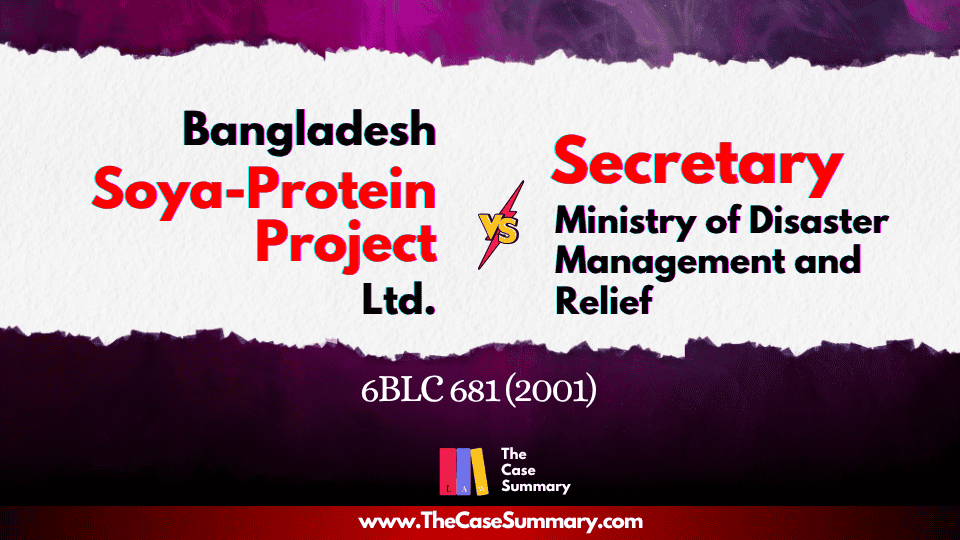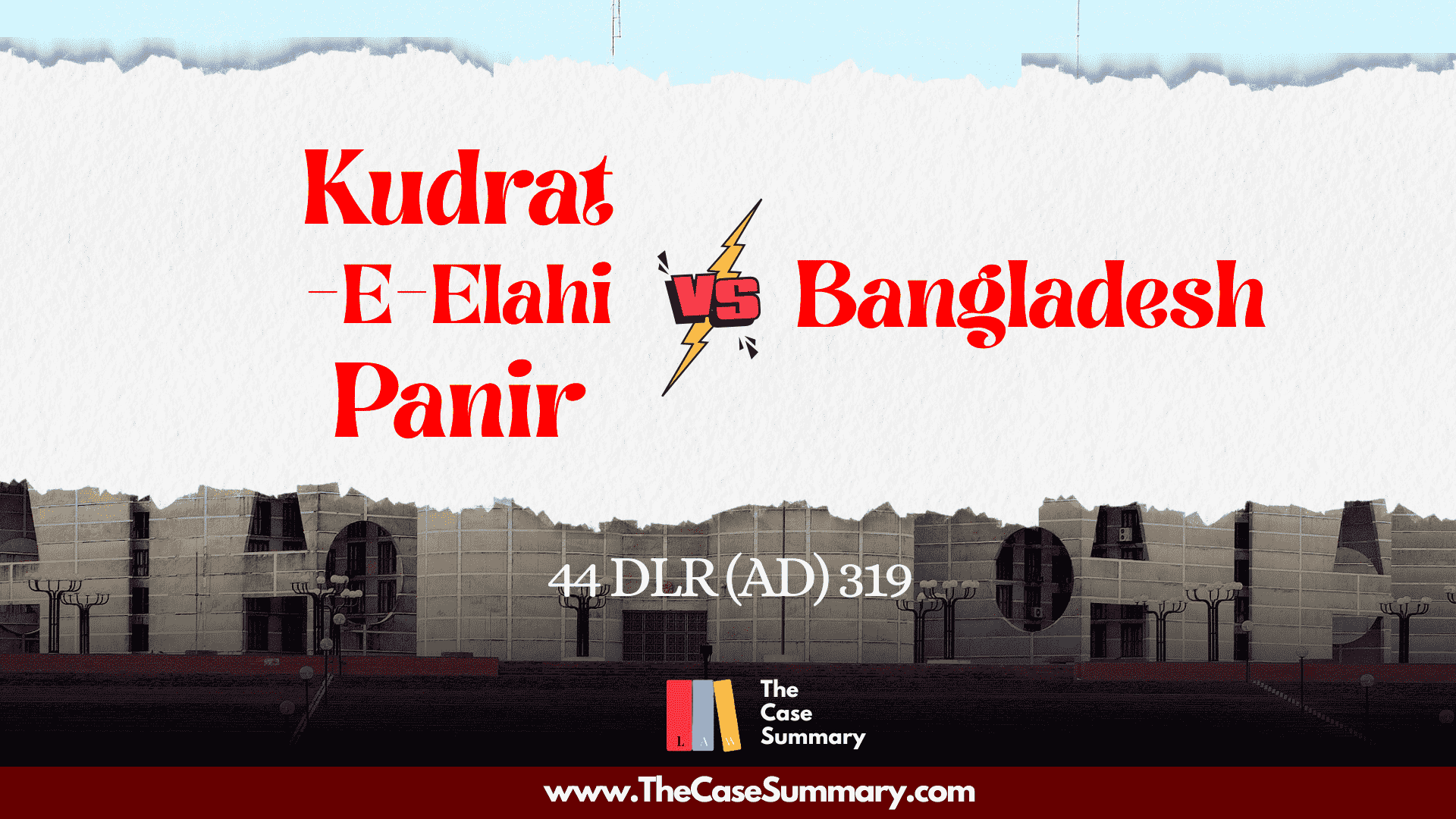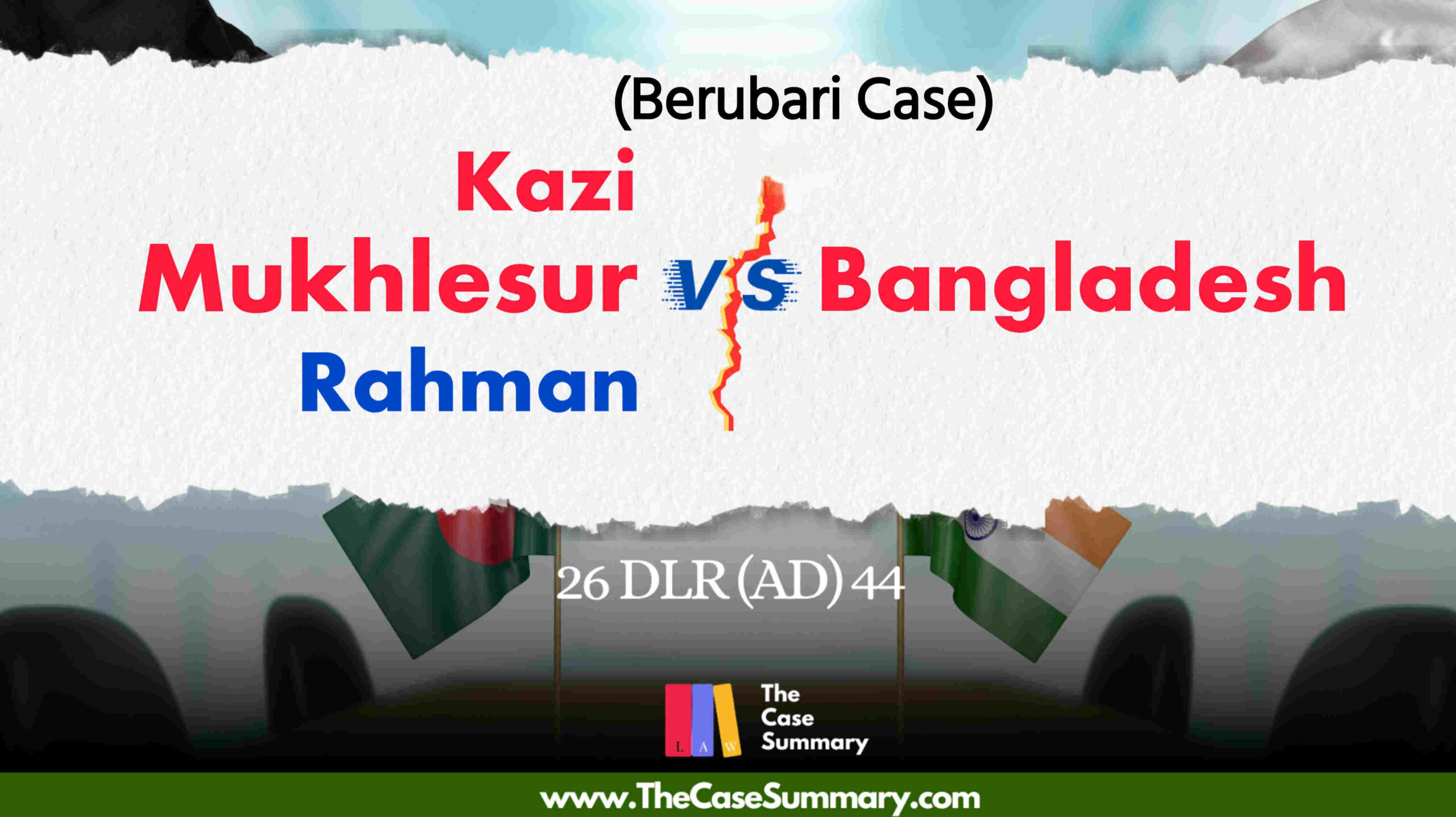Bangladesh Soya-Protein Project Ltd. vs Secretary, Ministry of Disaster Management and Relief
Citation: 6BLC 681 (2001)
Jurisdiction : Bangladesh
Petitioner: Bangladesh Soya-Protein Project Ltd.
Respondent: Secretary, Ministry of Disaster Management and Relief
Facts :
The dispute arose when the government discontinued a School Feeding Program with soy-based foods developed by the petitioner’s company. The technology of making soy foods was transferred to the private sector in 1976, and by 1989, the government started providing schoolchildren with soy products which were evaluated to have a positive effect. It was approved by the Prime Minister in 1992, stopped temporarily in 1995, and then reinstated formally in 1997 as Government Policy with supply and monitoring agreements. Even though it was successful, the program was suddenly discontinued in July 2000, leaving the petitioner without work. The petitioner, claiming heavy investment and legitimate expectation based on government policy, filed a writ under Article 102 for the reinstatement of the program. The Government, however, opposed stating the matter was only contractual as the agreements expired, and thus, were not subject to writ jurisdiction.
Issues :
1. Whether the government’s stoppage of the School Feeding Program violated the petitioner’s legitimate expectation created by repeated state policy and contracts.
2. Whether it was merely a contractual issue beyond the writ jurisdiction.
Arguments :
Petitioner’s Arguments:
Petitioner argued that the government’s abrupt discontinuation of the feeding program despite their huge investment, proven success, and national need was unfair and against legitimate expectation.
The petitioner company invested heavily to support the government School feeding program, employing many workers but the ministers halted the program, causing hardship. Despite repeated communications, the government gave no response. The petitioner claimed the program was justified to its reconstruction which was proved by the Prime Minister in a summary 2.7.1997. Which later re-entered into a new agreement on 28.12.1997. In the meantime, an evaluation on the necessity of the School Feeding Programs in Sadar police station and Kazipara police station within Sirajganj district was made on the request of the minister of home and telecommunication. The evaluation also recommended restarting the program. An application was also made by the Primary School Teachers’ Association to the Prime Minister for restarting the program within certain areas.
The petitioner argued that the program’s success was due to the petitioner company’s dedicated production of high-quality soya products benefiting undernourished children and earning wide acclaim. Since the program was a success, they naturally had a legitimate expectation that the program would continue for a reasonable time in the interest of undernourished children. The petitioner further argued that the ministry acted unfairly, unreasonably and cruelly, which destroyed the legitimate expectation, not only of the petitioner company but also of many millions of undernourished children of Bangladesh from getting benefit from the program.
Respondent’s Arguments:
The respondent raised the preliminary objection about the maintainability of the writ petition. The respondent argued that the petitioner’s rights emerged solely from the contractual relationship between the petitioner company and the Government authorities. As the contract was ended by the expiration of the deadline of the agreement, no rights remained enforceable under constitutional writ jurisdiction.
Consequently, the Government, by law, had no corresponding obligation to continue the School Feeding Program. The respondent further clarified that contractual matters must be enforced through civil remedy channels instead of invoking Article 102 of the Constitution. In conclusion, the respondent, on the ground of non-maintainability of the writ petition, pleaded that the writ petition is liable to be dismissed.
Decisions :
After the application of the doctrine of legitimate expectation and the test of Wednesbury unreasonableness, it appeared before the court that the Ministry did not consider relevant factors. Rather, it disregarded its own policy decision and acted in such a manner that no reasonable authority would have discontinued the program. Therefore, the discontinuance was found to be an irrational, perverse, and gross violation of legitimate expectation, not only of the petitioner company, but also of millions of vulnerable and malnourished children whom the program sought to serve.
Therefore, the rule was made absolute, and the Government was directed to implement its own policy decision regarding the School Feeding Program. The Court made it clear that, although the extent and the number of beneficiaries would be at the Government’s discretion, measures should be adopted to revive the program, preferably within two months.
Relevant Legal Principle :
Doctrine of Legitimate Expectation: The Doctrine of Legitimate Expectation is a principle in administrative law that protects individuals against abrupt or unfair changes in government policy or decisions, especially when they have been led to expect a certain treatment based on past actions, promises, or established practices of public authorities. However, legitimate expectation can be overridden only by valid public interest. In such cases, valid reasons or public interest to deny the legitimate expectation must be established.
The Wednesbury Principle or Unreasonableness Test: It is a legal standard used by courts to decide whether a public authority’s decision is so unreasonable that no reasonable authority would ever have made it.
Relevant Laws:
- The Constitution of People’s Republic of Bangladesh
- Article: 102
Author :
1. Saraf Al Sakif
2. Md. Ferdaus Hasan Purno
Note : The Case Summary is a platform by the law students, for the law students. We aim to summarize the facts and decisions of various important cases in both Bangla and English with utmost caution. However, this platform is in no way a replacement for going through the complete judgements by the law students and we discourage any learner from relying on case summaries alone. Thank you



